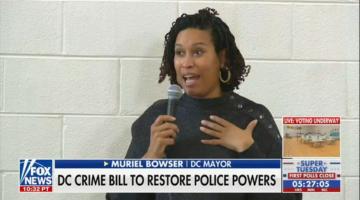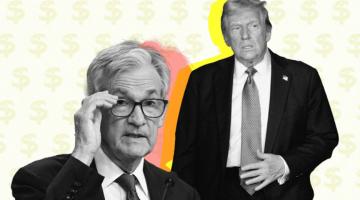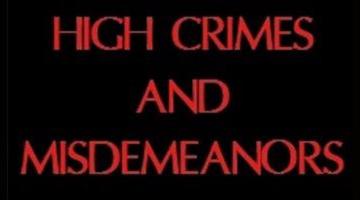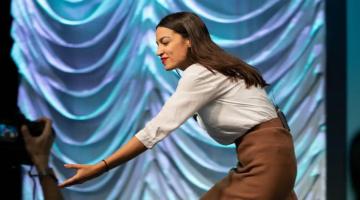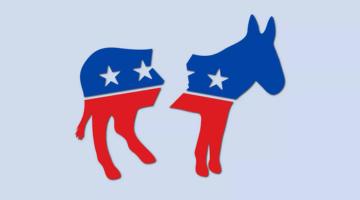Vote for Harris, because Trump. Vote for Clinton, because Bush. Manning Marable shows when it comes to right-wing Democrats, it’s deja vu all over again.
Angela Y. Davis has been pilloried by progressive groups for her recent comments on the upcoming US election. And rightly so. Last week, she was a featured guest at La Fête de l’Humanité, a festival organized in the southern suburbs of Paris by the French Communist Party newspaper, l’Humanité. Speaking to a crowd of tens of thousands Davis asserted that a Kamala Harris victory over Donald Trump (who she did not name, referring only to “the person leading the Republican Party”) was critical. For Davis, the push for a Kamala Harris victory is not because of her race or gender, but because her presence in the White House would enable “those of us who are more radical than Kamala Harris to put anti-capitalist and anti-racist programs forward.”
Of course, it is not difficult to be “more radical” than Kamala Harris, a figure who, true to the right-wing Democratic Party she represents, stands far to the right of Ronald Reagan. She is also currently presiding over the expansion of fascism at home and imperialism and genocide abroad. Why should we believe, then, that, once in office, Harris – who, to date, has received endorsements from Wall Street, Dick Cheney, and a large number of former staffers from the George W. Bush regime – would suddenly find her “radical” self and open up space for humane policies and radical programs?
Barack Obama, who Davis characterized as a figure who was able to mobilize and inspire young people, certainly didn’t. Davis, somewhat quixotically, acknowledged this fact during her remarks at La Fête: “When Obama was elected, that was a very important victory,” she stated, but “it was not a victory in relation to what he actually accomplished during his presidency…” It is significant that she doesn’t acknowledge that Obama’s “victory” was really a victory for Wall Street, its oligarchs, and US imperialism. If she had, she would not have turned around and endorsed an even more belligerently right-wing Hillary Clinton in 2016.
Yes. Angela Davis also told us to vote for Hillary Clinton.
Davis is not that naïve. She knows full well that she is asking us to settle for a Democratic party that gets more right wing and more fascist by the year. So, then, what’s the point? Vote for Kamala because she’s not “the person leading the Republican Party” with the hope she will open up a space for “anti-capitalist and anti-racist programs” when Davis very well knows that she will not?
It doesn’t make sense. It does, however, encapsulate the kind of twisted, pretzel logic that the Democrats have been pushing every four years for the last few decades. A logic that people like Davis, and their unthinking minions, have accepted and deployed. Vote for Harris, because Trump. Vote for Clinton, because Trump. Vote for Obama, because Bush. Vote for Clinton, because Bush.
But Davis follows a well-worn pattern of presumably “radical” Black scholars asking us to vote for Democratic Party presidential candidates even as the party shifted rapidly rightward. In fact, the late historian Manning Marable made this exact argument back in 1992 in his nationally-syndicated newspaper column. In an editorial titled “Criticize Clinton, but beat Bush,” Marable carefully maps out how far right the Democratic Party had drifted under the Reagan years, arguing that Bill Clinton was far more right wing than Jimmy Carter — whom Marable attacks for his “aggressive cuts in social programs.” Marable writes: “For progressives, the real question presented by the Clinton-Bush electoral contest boils down to a simple alternative: Do I vote for Clinton, or do I stay home on November 3?”
His answer? “African Americans must vote against Bush by voting for Clinton – but we must be prepared to struggle every day against the conservative policies of a Clinton administration.”
Clinton beat Bush. Many Black folk celebrated. But the progressive openings and the radical programs never came. In victory, Clinton and the Democratic Party were emboldened to abandon African Americans and the working class while appeasing the white middle class and their corporate sponsors. “White liberal guilt is dead,” a dour Marable wrote soon after the 92 election, in a column called “Why Bill Clinton has no ‘mandate’ for change.”
Since 1992, meanwhile, the Democratic Party has moved so far rightward, stealing all the right-wing talking points and draconian policies of the Republican Party – from immigration to genocide – that it has left the Republicans with only brute racism to rally its white troops.
It is a futile Sisyphean move to suggest, as Angela Davis did, that a vote for Kamala Harris will open up space for radical movements, especially as the Biden-Harris administration is currently cracking down on radical movements, increasing US military belligerence around the world, and funding a genocide. It is suicidal to think that a Harris victory would somehow give her a progressive mandate for change when change has not been on the horizon during the last four years – or the last 40.
And it is nothing less than an extraordinary and willful act of forgetting that we once again find ourselves in the position of being harangued and browbeaten into voting for a candidate who is not the “lesser evil,” or even “the more effective evil” but, quite simply, just evil. To break the amnesia, read Manning Marable’s “Criticize Clinton, but beat Bush.” It is reprinted below.
Criticize Clinton, but beat Bush
Manning Marable
The presidential campaign of 1992 seems in many respects a replay of 1976. In both campaigns, a moderate Democratic governor from a Southern state emerges from the middle-class hinterland to seize his party’s nomination from the liberal establishment.
An embattled, frustrated Republican president presides over a major economic recession, driving his popularity polls into the basement. The Republican incumbent is even challenged unsuccessfully by a leader of the right wing of his own party in the primaries.
In November 1976 Jimmy Carter narrowly defeated Gerald Ford. This November Bill Clinto should narrowly defeat George Bush— but nothing in politics is predictable.
The historical analogy breaks down when we consider the social and ideological forces behind Carter and Clinto respectively. Carter ran in 1976 with the Democrats having won seven of the previous 11 presidential contests and with the national disgrace of Watergate tarnishing the Republicans.
Nevertheless, Carter was unable to transform the Democrats into an explicitly “centrist” party, despite his aggressive cuts in social programs.
But after a decade of Reaganism, the political cultures of both major parties have shifted decisively to the right. It was in this context of reaction that Clinton and the conservative cabal, the Democratic Leadership Council, seized control of the party’s national apparatus.
Their conservative agenda represents a sharp break from New Deal Great Society liberalism. Clinton’s basic strategy is to speak primarily to two key constituencies: Reagan Democrats, the White blue-collar workers who abandoned the party of Roosevelt and Kennedy over affirmative action, busing for school desegregation, and welfare—and younger, suburban White professionals who were attracted to the candidacies of Gary Hart in 1984 and Paul Tsongas earlier this year.
The DLC’s objective is to win the support of at least 47 percent of the overall White electorate. Clinton is painfully aware that since 1948 the Democrats have captured the majority of White votes only once in any presidential election.
In the three presidential elections in the 1980s, Republican candidates won 33 million more votes than the Democrats, with an eight-to-one margin in electoral votes.
This explains Clinton’s determination to avoid being characterized as a “tax-and-spend liberal,” of the Kennedy-Mondale-Dukakis tradition Preaching “family values,” “patriotism” and “personal responsibility,” he frequently sounds like Republic evangelist Pat Robertson. Rainbow Coalition chief strategist Jack O’Dell suggests that a Clinton presidency would be roughly similar to the administration of Harry S. Truman.
For progressives, the real question presented by the Clinton-Bush electoral contest boils down to a simple alternative: Do I vote for Clinton, or do I stay home on November 3? At times, when I watch Clinton speak on C-Span, his words almost make sense, but I know he’s not talking to me. I fear that a Clinton White House would be even further to the right than that of Jimmy Carter.
Despite these misgivings, I would still advise African-Americans, other people of color and progressives to criticize Clinton and to beat Bush this election year.
We must ask ourselves, whether a substantial, critical distinction can be made between Clinton-Gore and a second-term for Bush-Quayle? Millions of women, threatened with the loss of their freedom of choice on the issue of abortion, can certainly understand the dangers of a Bush victory over Clinton.
People of color recall that Bush vetoed the 1990 Civil Rights Act and turned Willie Horton into Michael Dukakis’s unofficial running-mate.
If fewer than 50 percent of Black voters go to the polls in November, the Arkansas Democrat will probably lose, regardless of the White vote. African Americans must vote against Bush by voting for Clinton-but we must prepare to struggle every day against the conservative policies of a Clinton administration.

